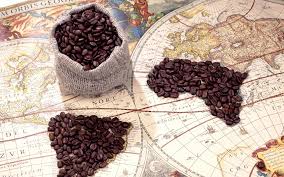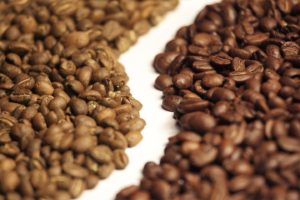Table of Contents
*This post may contain affiliate links. As an Amazon Associate we earn from qualifying purchases.
You have finally found the right machine to match your love affair with coffee. That’s great. Now, you’re probably excited to make high-quality coffee at home. Not too fast. In order to make the best-tasting coffee, make sure that you get the freshest, highest quality coffee beans there are. Remember, exceptional coffee can only come from exceptional beans. In this case, we highly recommend that you choose Arabica coffee beans.
Without a doubt, coffee aficionados have heard of Arabica beans before. But if you want to dig a little deeper and find out more about Arabica coffee, then we urge you to read on. Here are 4 little-known facts about Coffea Arabica.
Arabica history

Image Source: www.tibaagan.com
There are several different types of coffee beans available in the market. Arabica is the most widespread coffee in the world, accounting to over 60% of the world production. Arabica coffee dominates the world market. Many of you probably enjoy a cup or two on a daily basis. But do you know where the coffee beans came from?
Arabica is a species of coffee originally indigenous to the forests of the Southern Highlands of Ethiopia. It is believed to be the first species of coffee to be cultivated. With its origin dating back to 1,000 B.C., Arabica is often considered as the Adam and Eve of all coffees.
No one knows exactly when coffee was discovered, but there are several legends surrounding the first use of Arabica beans. According to legends, Kaldi, the goat herder, was the one who discovered coffee. He discovered the potential of the coffee beans after realizing that he became so energetic after eating the cherries from a certain tree- the Arabica tree. Kaldi shared his discovery with the abbot of the local monastery. Wanting to prove his theory, they made a drink out of the berries. They then realized the effectiveness of the fruit as it kept them energetic that they didn’t want to sleep at night. Eventually, word spread out until it reached the Arabian Peninsula. This is where coffee consumption started to flourish.
Where is Arabica coffee grown?

Image Source:www.knowyourgrinder.com
Most people drink coffee on a daily basis. Unfortunately, not everyone makes an effort to learn more about the coffee they are drinking, let alone where it came from.
Arabica is the world’s most produced coffee, accounting to over 60% of the world’s coffee production. To get the best results from your coffee plants, having the proper growing conditions is of great importance. Arabica is fragile coffee beans that can easily be damaged by poor handling and cold temperatures. They are also susceptible to attacks from various pests. As such, Arabica beans are ideally grown in cool, subtropical climates. They must be grown at a higher elevation of 600 to 2,000 meters because of their fragility.
Coffee Arabica is native to central Ethiopia. Today, however, they are now grown in many parts of the world, including Colombia, Brazil, and Indonesia. Brazil is one of the most significant Arabica producers. Unless you live in its native region, you may find it difficult, if not impossible to grow Arabica beans. Remember, these are fragile beans and the growing conditions can be hard to replicate. Chances are the temperature will be too cold or too volatile to allow the tree to develop.
Difference between Arabica and Robusta coffee

Image Source: www.clumsygoat.co
To the average person, the type of coffee beans used to make their morning coffee isn’t really a big deal. They would be happy enough to sop in their coffee in the hopes of getting the energy they need to power them throughout the day. This is especially true for individuals who had to pull an all-nighter. But for the coffee connoisseurs, choosing the best coffee beans are of great importance. They know that the type of coffee bean they use would have a significant impact on the final beverage.
There are dozens of different varieties of coffee beans. Robusta and Arabica are among the most popular species of coffee grown commercially. As a regular coffee drinker, you are probably familiar with these types of coffee beans. Which of these is the right one for you?
Pretty much all coffee beans look the same once roasted. But the difference lies in the taste. In a cup, Arabica coffee has a sweeter, softer taste with just a mild hint of bitterness. It has a slight and pleasant acidity with an aftertaste of caramel. Arabica beans smell like blueberries when unroasted. Meanwhile, they give off a perfumey scent with notes of sugar and fruit tones when roasted.
Robusta coffee, on the other hand, possesses twice the amount of caffeine as Arabica. It has a stronger, harsher flavor and heavier body. Robusta is best sampled on the back palate, where bitter notes are most apparent. Many great espresso blends use Robusta coffee beans due to their strength and crema.
A good quality Robusta coffee won’t lose its flavor, even if you add milk and sugar to it. This is the ideal choice for cream and sugar lovers.
Specialty coffee

Image Source:www.swansalford.co
Over the past few years, the specialty coffee scene has been booming across different parts of the world. The rise in specialty coffee shops is largely attributed to the growing number of people who are seeking out the best quality of coffee that they can enjoy in and out of the home. Specialty coffee is, by far, the most interesting and exciting coffee segment at the moment.
Most people opt for specialty coffee mainly because they taste amazing. This is because they are sourced from high-quality coffee beans.
The finest, best-tasting coffee is usually made from Arabica beans. As such, good quality Arabica coffee beans are often the first choice for specialty coffees. They are chosen for certain characteristics such as level of acidity and aroma. The coffee beans, in turn, are roasted to their greatest flavor potential and then brewed to well-established standards; hence, resulting in best tasting and highest quality coffee possible.

